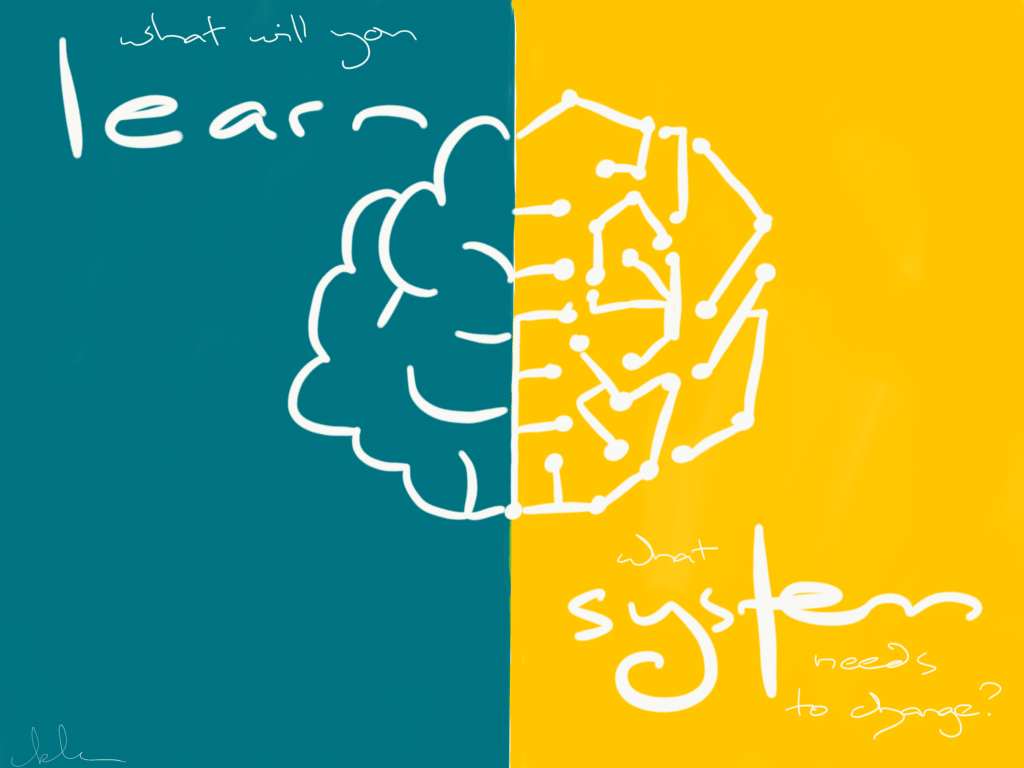When you fail.
When something goes wrong.
When the conversation was difficult, or the client left, or got angry at you. When the applicant or team member didn’t work out. When you screwed up, when it broke, when you missed the deadline. When someone complains, or is upset, or doesn’t understand.
There are two questions to ask:
- What will I learn?
- About yourself
- About the thing (whatever it is)
- What system needs to change?
Those two questions protect you from being defensive, laying blame, being crushed under the weight of whatever it is that happened.
There is always, always something you can learn.
There will be something you can learn about yourself. Ask yourself questions like:
- How did I respond? What does that tell me?
- How do I feel? Where does that come from?
- Did i have any ‘gut feel’ about this? What did I do about it then? Why did I or didn’t I take action?
- What do I tend to do, feel, think, act when these kinds of things happen? Is that how I want to be?
There will also be something you can learn about the thing – the client, the product, the software, the hiring process. You can learn what works, and what doesn’t. What you enjoy, and what you don’t. You can ask:
- Is this something I enjoy? Do I like working with this type of client?
- Do I need more training or help with this thing?
- How does it actually work?
- Who else is doing it well?
Ask what system needs to change, to protect against it happening again
The second question is, what system – or what part of a system – needs to change?
When you ask what system needs to change, it helps protect you from making the mistake again. Ask questions like:
- How did this happen in the first place? What led to this happening?
- What is our system now? Do we have one at all?
- If we don’t have a system, what would a basic one look like?
- If we have a system, what broke or didn’t happen or didn’t work as we expected? What did we miss, if anything? What did we let slide?
- What one, small thing could I change right now which will begin to improve this system?
That last question is a small one, and it has a huge impact over time.
When it comes to systems, it’s tempting to think we need to block out an entire day. Plan it out with maps and whiteboards and wireframes. Hire a consultant. Prepare a change management strategy.
The best systems aren’t created in a day: they are continually changed based on real life
Realistically, the best systems are created when you 1) just get started and 2) adapt it slightly with every “real life” situation that impacts your system.
We’ve been in a big growth spurt at PF and are in a constant stage of hiring. So we have applications coming in fast and continuously, from many different people and places.
We have a very clear, 7-stage hiring process which works really well. It’s not perfect, and we’re continually adjusting it to reflect what we’re learning and the growth of our agency, but it’s good. Some people only make it through a stage or two. Others make it almost all the way to the end and remove themselves from the process. And a few make it all the way through to the end with flying colours and become part of the PF team.
Always, every hiring round, we have at least one person (or more) who decide our hiring process is too difficult or too harsh or too intense or asks too much…and they take it upon themselves to explain to us why it’s not a good process.
Now, we know our process is good. We’ve learned to trust it. If someone makes it all the way to the 7th stage of the 7 stages and the whole team is still dithering or unsure or struggling to get enthusiastic even though the person ticks all the right boxes….we have to say no. And similarly, if someone submits a video and we think “this is the best person ever hire them yesterday”, we still know to continue with the remaining 6 stages. We’ve been surprised enough times by the patterns which emerge later, which weren’t evident at the beginning. If they’re truly amazing, they will sail through every stage and we’ll hire them with enthusiasm. If they’re not, the process will show it.
We also know our system isn’t perfect. It never will be, because our agency is continually changing. What worked when we had 6 people doesn’t work the same with 12 people, or 16 people, or 25. So we’re always open to considering what, if anything, we need to change.
So when we get an email from someone who says “I’m sure PF is a great company and I’m sure your hiring process works for you BUT….” followed by a list of all the things they didn’t like, and telling us they don’t want to be in it anymore, we thank them for the effort they put in thus far, honour them for making the decision to remove themselves, and wish them well.
But we don’t just rest on our laurels, pat ourselves on the back for our great system, and move on. We stop for a second to ask – what will we learn, and is there any system that needs changed?
One person mentioned they didn’t like our wording about salaries. We had basically said when it comes to salary, we want to hire the right people – not people who are just looking for jobs or will come into one job for money and then leave for more money elsewhere. We want people who love PF because of who PF is. We want people who might even take a lower salary than they could get in another position because they love PF so much. This person didn’t like that, felt it was insulting, and wanted to know about the money.
So we stopped for a moment and thought about it. Just to check what we said about salary, and whether it reflected best who we are and what we offer here. Because we do have good salaries, and I absolutely believe in paying people well for the work they do. We’ve checked our salaries against the industry average and they fit the range (or are higher), and we’ve recently introduced bonuses for the full team at least once a year (or more) based on targets.
So the person who removed themselves from the process showed something about their attitude towards salary and money by what they said, and they were right to go elsewhere. But, the fact they pointed it out caused us to check that wording, realise it was a little dated and needed to reflect the new changes we’ve made including bonuses. So we did. We changed the core wording for our vacancies, updated all the vacancy pages on the website, job done. Took 5 minutes and that little system was fixed.
Some people don’t like our tester projects. They find them too hard, ask too much, take too long. No problem – if you’re not willing and excited to show us what you can do, you probably won’t like the work. But one of the comments caused us to look again at the wording we send along with the tester project explaining how it works, and we tweaked that a little to make it clearer, and that’s another tiny system fix which will make the process go even more smoothly.
We didn’t change the whole process. It’s still good, it still works, and every person who has removed themselves was right to do so. But our system will be a tiny bit better because we stopped to ask the questions.
What will we learn?
and
What system needs to change?
What happened this week which you could apply those two questions to? What are your answers?



